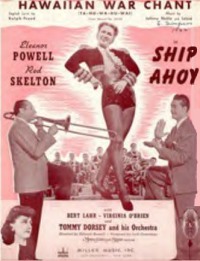Comments
Marc De Bruyn (emdebe@village.uunet.be), August 23, 2003
"Hawaiian War Chant" was composed by Johnny Noble, who borrowed the melody from Prince Leleiohaku's 1860 song, "Kaua i ka Huahua'i" ("We Two in the Spray"). Harry Owens ("Sweet Leilani") wrote his own version to the same melody, called "The Laughing Song" but it never caught on while Noble's version was a huge success.
"Hawaiian War Chant" came to popular attention in 1939, when Tommy Dorsey's big band covered it as a fast swing number featuring a driving beat played mostly on the tom-toms. It was a big hit, at a time when Gene Krupa had just formed his own band and had a big hit with "Drum Boogie", and drummers were getting the spotlight in big bands for the first time.
"Hawaiian War Chant" had actually been published in the US over ten years before, when Johnny Noble included it in one of his collections of adaptations of traditional Hawaiian songs; Noble was a key figure in the introduction of Hawaiian music to US audiences: he published a number of collections of traditional Hawaiian songs that he adapted to the Western scale and for which he provided loose translations or original lyrics.
In 1936, lyricist Ralph Freed added English lyrics. For those who want to sing-along: "There's a sunny little, funny little melody, that was started by a native down in Waikiki. He would gather a crowd down beside the sea and together they'd play his gay Hawaiin Chant. Soon the other little natives started singin' it and the hula hula maidens starting swingin' it. Like a tropical storm that's the way it hit, funny little gay Hawaiian chant. Ow way tah tualan, me big bad fightin' man. Tho it started on an island down Hawaii way, it's as popular in Tennessee or Ioway. If you wander into any cabaret, you will hear this gay Hawaiian chant. Ow way tah tualan, me big bad fightin' man. Tahuwai la a tahuwai wai la, ehu hene la a pili koo lua la, pututui lu a ite toe la, hanu lipo ita paalai. Au we ta huala. Tahuwai la a tahuwai wai la, ehu hene la a pili koo lua la, pututui lu a ite toe la, hanu lipo ita paalai. Au we ta huala."
In 1942, "Hawaiian War Chant" was used for the movie "Ship Ahoy", starring Eleanor Powell, Red Skelton and the Tommy Dorsey Band.
Since Dorsey's recording, "Hawaiian War Chant" has been interpreted in more different ways by more different artists (The Revelairs, The Ventures, Ray Charles Singers, Henry Mancini, Sonny Lester, Billy Vaughn, Sandy Nelson, ...) than just about any other exotica number, ranging from lush string-laden syrup to numerous percussion-only showcases to harpsichord filigrees to Moog bubble pops. It's one of those instant tip-offs that you're looking at a piece of exotica-age pop.
"Hawaiian War Chant" became popular in the sixties too, thanks to the wonderful interpretation of Spike Jones ("and His Wacky Wakakiians with Chorus"), of the Deane Kincaide arrangement that parodied Dorsey's version (see or better hear: Spike Jones and His City Slickers, Spike's Funniest Hits, RCA Victor LPM-2224).
